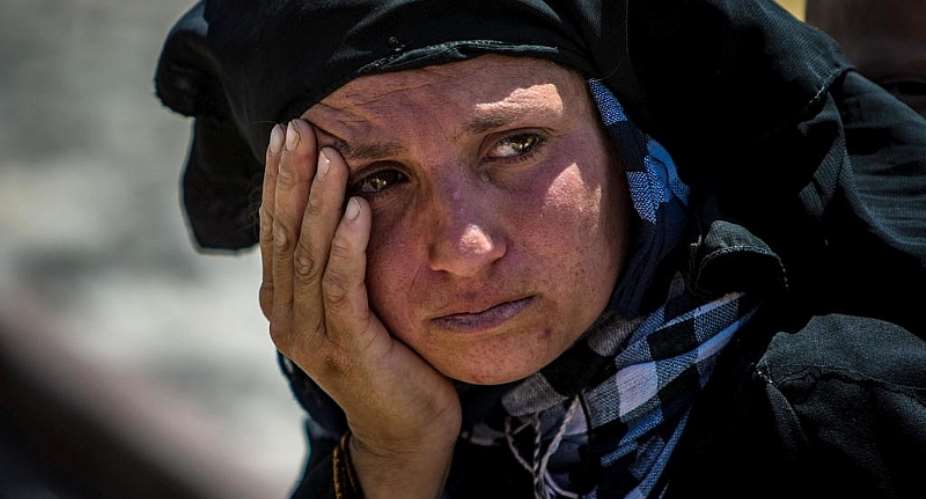Working under the slogan "With a women's pen in the pursuit of truth," JinNews is a groundbreaking women's news agency in Turkey. But Jin's future is increasingly in doubt, the agency becoming a target in the government's "war on terror".
"JinNews is pursuing journalism wherever women are," explains Gulsen Kocuk, Jin's Turkish news editor, "In every aspect of their lives, to make women's work visible, women's existence visible, and provide a platform where they can express their views."
Jin was founded in 2017, has a news network staffed entirely by women, which Kocuk says works hand-in-hand with Turkey's growing women's movement.
"There is a discourse of male state violence," argues Kocuk, "Jin News puts up a fight against this discourse, just like the women's movement does. They are not independent of each other. Women are subject to male violence but, at the same time, to state violence."
Reporting on human rights abuses
Jin is based in Turkey's predominantly Kurdish southeast, the center of a decades-long Kurdish insurgency. The agency regularly reports on alleged human rights abuses by security forces, particularly against women, including rape.
Such reporting is now making Jin a target — the agency is accused by the authorities of "terrorist propaganda."
"Almost 20 of our colleagues had been in and out of prison. We couldn't count the number of raids," said Kocuk. "It is not hard to see what's at stake in Turkey for a journalist using her pen freely. "
Dangerous cat-and-mouse game
Jin has been forced into a cat-and-mouse game with Turkish authorities, who have closed down the agency's website dozens of times, only for the agency to reopen under a different name.
In December, Turkey was ranked as the world's second-worst jailor of journalists by the Committee to Protect Journalists, a New York-based NGO.
But Emma Sinclair-Webb, the Senior Turkey researcher with Human Rights Watch, says it's not only Jin's reporting of contentious subjects that's making it a target.
"They are not treated as journalists. They are treated as terrorists, and this is the problem. The government doesn't understand there is a right to do objective journalism in the region."
"The other reason, in the last year, we've seen particular intolerance by government officials of women's rights activism around the Istanbul Convention and combating violence against women," said Sinclair-Webb.
International guarantee of women's rights
The Istanbul Convention is an international treaty dating back to 2011 which guarantees women's rights and legal protection against violence. Calls by some government ministers for Turkey to withdraw from the convention have seen women protest across the country, as the number of women murders has soared in recent years.
"Women in Turkey are angry," said Melek Onder of the women's campaign group Stop Femicides. "But we know that this anger makes the women's movement more powerful and strong. We have a slogan: 'apply the law and keep the women alive'."
Sinclair-Webb of Human Rights Watch says the targeting of women's activists by the authorities is particularly severe in Turkey's predominantly Kurdish region because fighting for gender rights can be associated with support of terrorism.
PKK call for equality of women
A key policy demand of the Kurdish rebel group the PKK is equality of women. The HDP, Turkey's main legal pro-Kurdish party, has a strict policy of all elected positions being jointly held by a man and woman. The HDP, Turkey's second-largest parliamentary opposition party, is labeled a terrorist organisation by the government.
Dozens of women activists in the Kurdish southeast have been detained in recent months in the government's war against Kurdish separatists.
Jin continues to doggedly reports these developments; aware such reporting carries the risk of further police raids and prosecutions.
"Fear doesn't even enter our minds," said Kocuk. "Of course, we wish to be able to write in a safer environment. But if you are advocating for a free press, there shouldn't be a place for fear because fear makes you stand back. We are not afraid, and we keep writing."





 Dumsor: Don't rush to demand timetable; the problem may be temporary — Atik Moha...
Dumsor: Don't rush to demand timetable; the problem may be temporary — Atik Moha...
 Space X Starlink’s satellite broadband approved in Ghana — NCA
Space X Starlink’s satellite broadband approved in Ghana — NCA
 2024 election will be decided on the grounds of the economy; choice of running m...
2024 election will be decided on the grounds of the economy; choice of running m...
 Dumsor: We're demanding less; just give us a timetable — Kwesi Pratt to ECG
Dumsor: We're demanding less; just give us a timetable — Kwesi Pratt to ECG
 Do I have to apologise for doing my security work, I won’t – Simon Osei-Mensah r...
Do I have to apologise for doing my security work, I won’t – Simon Osei-Mensah r...
 All my businesses have collapsed under Akufo-Addo — NDC Central regional chair
All my businesses have collapsed under Akufo-Addo — NDC Central regional chair
 Military, Prison Officers clash in Bawku, three injured
Military, Prison Officers clash in Bawku, three injured
 GRA-SML contract: MFWA files RTI request demanding KPMG report
GRA-SML contract: MFWA files RTI request demanding KPMG report
 Court threatens to call second accused to testify if NDC's Ofosu Ampofo fails to...
Court threatens to call second accused to testify if NDC's Ofosu Ampofo fails to...
 Family accuses hospital of medical negligence, extortion in death of 17-year-old...
Family accuses hospital of medical negligence, extortion in death of 17-year-old...
